By Riley Waggaman, a Moscow-based writer and former RT editor
On July 17, 2020, Russian pharmaceutical company R-Pharm announced it would produce and supply a COVID vaccine that was under development by AstraZeneca and the University of Oxford.
Hailing the agreement, Alexey Repik, Chairman of the Board of Directors of R-Pharm, said his company would serve as an AstraZeneca “supply hub” for 30-50 countries—including Russia, a “top priority.”
The drug was approved for emergency use in the UK five months later and soon after received the green light from governments around the world.
But R-Pharm’s plan to supply Russia with AstraZeneca doses has yet to materialize: the drug has not been authorized for use by Moscow. Luckily, R-Pharm was smart enough to hedge.
In June 2020, R-Pharm partnered with the Russian government’s sovereign wealth fund, the Russian Direct Investment Fund (RDIF), to produce a homegrown COVID vaccine—what later became Sputnik V.
RDIF is the main financer behind Sputnik V and was tasked by the Russian government to “organize the production” of the vaccine and “promote it in foreign markets.”
R-Pharm is included in RDIF’s portfolio. This means the Russian government has a financial stake in Sputnik V’s success—and also AstraZeneca sales.
Joining forces
The ties between the Russian government and AstraZeneca aren’t just financial.
In a press release dated December 11, 2020, the British-Swedish pharmaceutical giant revealed it would “soon begin exploring with Gamaleya Research Institute in Russia to understand whether two adenovirus-based vaccines can be successfully combined.”
Gamaleya—operated by the Russian health ministry—is credited with creating Russia’s flagship vaccine.
As part of the “memorandum of cooperation” between RDIF and AstraZeneca, the partners agreed to conduct joint trials using a combination of their two drugs in hopes of developing a COVID vaccine cocktail. The original plan was to register the combo shot in Russia, Gamaleya’s director, Alexander Gintsburg, said at the time.
Russian President Vladimir Putin participated in the signing ceremony and praised the Kremlin-Big Pharma alliance as a “good, convincing example of combining scientific forces, technologies, investments for a common goal” that would “protect the life, health and safety of millions of people on the planet as a whole.”
A similar product
It would be wrong to characterize the Russian government and AstraZeneca as strange bedfellows. Actually, they’re a perfect match.
There are no “significant” differences between Sputnik V and AstraZeneca’s adenovirus-based vaccine, according to Gintsburg. In fact, Gamaleya’s director said in December 2020 that joint tests with the British pharmaceutical company would not take long because “the two technologies that underpin AstraZeneca’s vaccine and Sputnik V are very similar.”
By March 2021, numerous European nations had suspended use of AstraZeneca’s shot amid reports the drug was causing blood clots.
Despite the serious safety concerns, RDIF did not abandon its Big Pharma partner.
In August 2021, Argentina began administering AstraZeneca and Moderna shots to people who had received the first Sputnik V dose. The Argentinian government said it was mixing the drugs due to supply shortages, but RDIF CEO Kirill Dmitriev insisted this had been the plan all along.
“We suggested it, we always wanted to do a combo,” Dmitriev said at the time. “Sputnik is the first combined vaccine, the first mix and match, which consists of two different shots. We have said from the beginning that two different shots work better than two identical ones.”
If Sputnik V is superior to Big Pharma shots, why is Dmitriev—a Harvard-educated ex-Goldman Sachs banker and World Economic Forum “Young Global Leader” (2009)—so supportive of creating vaccine cocktails?
Mystery suppliers
In October 2021, R-Pharm’s founder revealed in an interview that the firm was manufacturing both Sputnik V and AstraZeneca’s vaccine in Russia, the latter strictly for export:
The most important sales markets are the Middle East and the Gulf countries, North Africa, i.e. countries such as Saudi Arabia, the United Arab Emirates and Morocco. In total in around 40 countries. Countries that also purchase our Sputnik Light. We are also currently researching whether a combination of the Oxford vaccine, i.e. AstraZeneca, and Sputnik Light can be used for booster vaccinations.
Manufacturing both AstraZeneca and Sputnik V is quite an ambitious undertaking—particularly because Russia has struggled with scaling up production of its homegrown shot.
For example, R-Pharm reportedly transformed a “Soviet-era car factory” into a “state-of-the-art facility” as it scrambled to churn out vials of Sputnik.
Thankfully, AstraZeneca offered assistance with production-related questions and issues, Reuters reported in May 2021:
To deal with the problems, Russia has teamed up with AstraZeneca, whose vaccine uses a different adenovirus shot, two sources familiar with vaccine strategy said. Human trials of a mix-and-match vaccine are under way in several countries.
Of course, R-Pharm isn’t the sole manufacturer of Sputnik V. At least six other Russian firms produce the drug domestically. The Gamaleya Center also has its own manufacturing facilities.
But here’s where things get a bit strange. A Russian media report based on publicly available government documents revealed Gamaleya was purchasing Sputnik V doses from an unknown supplier and then reselling the vials under its own Gamaleya “brand”:
The center, which is listed as the manufacturer of the Sputnik V vaccine, for 2020-2021 acted as the customer of about 30 government contracts for “execution of work on the production of the drug Gam-COVID-Vac” [Sputnik V]. All contracts were signed according to the “purchase from a single supplier” scheme, but the supplier itself was not disclosed.
Three contracts were concluded in foreign currency. Their total cost is 30.18 million US dollars (about 2.12 billion rubles). For example, on July 10, 2021, a contract was signed for US $15.6 million and for 1 million doses.
In other words: Gamaleya has been outsourcing the production of Sputnik V doses to an unidentified third party—doses that the institute itself is supposed to be manufacturing.
As the report observed:
Based on the results of the procurement analysis, it can be concluded that during these two years the Gamaleya Center purchased millions of doses of vaccine from a third party.
It is noteworthy that the center itself under the management of Gintsburg acted as a supplier under contracts for the same vaccine, that is, it actually resold it already to various regional government agencies and departments?
The Russian government has repeatedly claimed that money is not the motivating factor behind Sputnik V. Maybe, but tidy profits are still being made.
Gintsburg has openly admitted his work on Sputnik V has “significantly improved” his “financial situation.”
Crickets from “alt” media
While “independent” analysts accuse Western governments of “Russophobia” for not embracing Sputnik V, the simple truth is that the Kremlin and Big Pharma are already in cahoots. Why there is so little discussion on this matter is a story for another time.
Stay tuned.

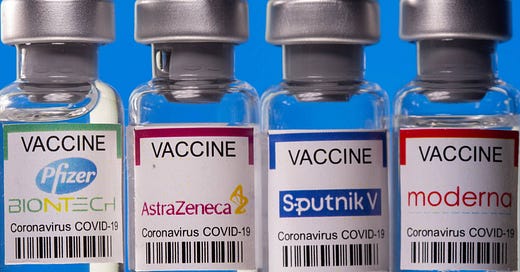




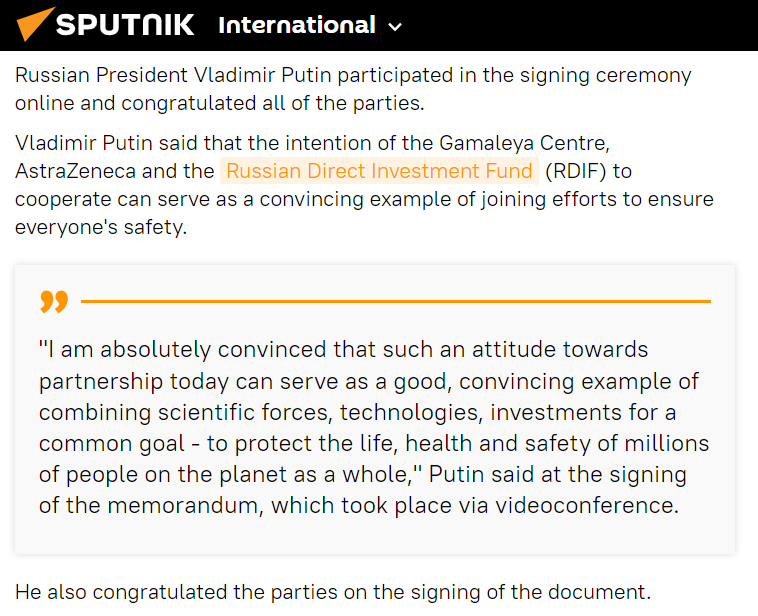


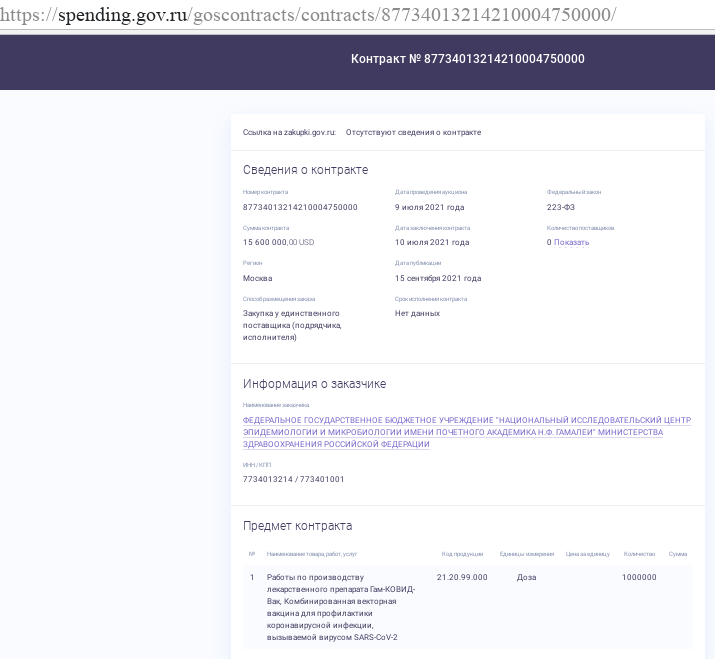
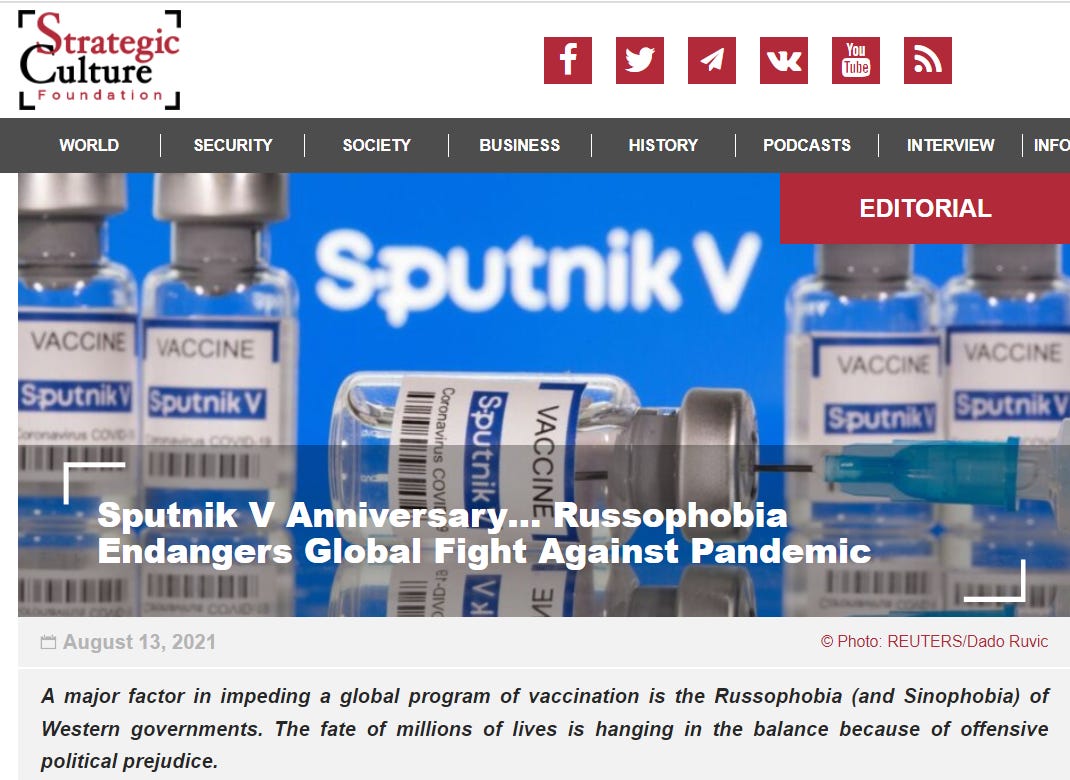
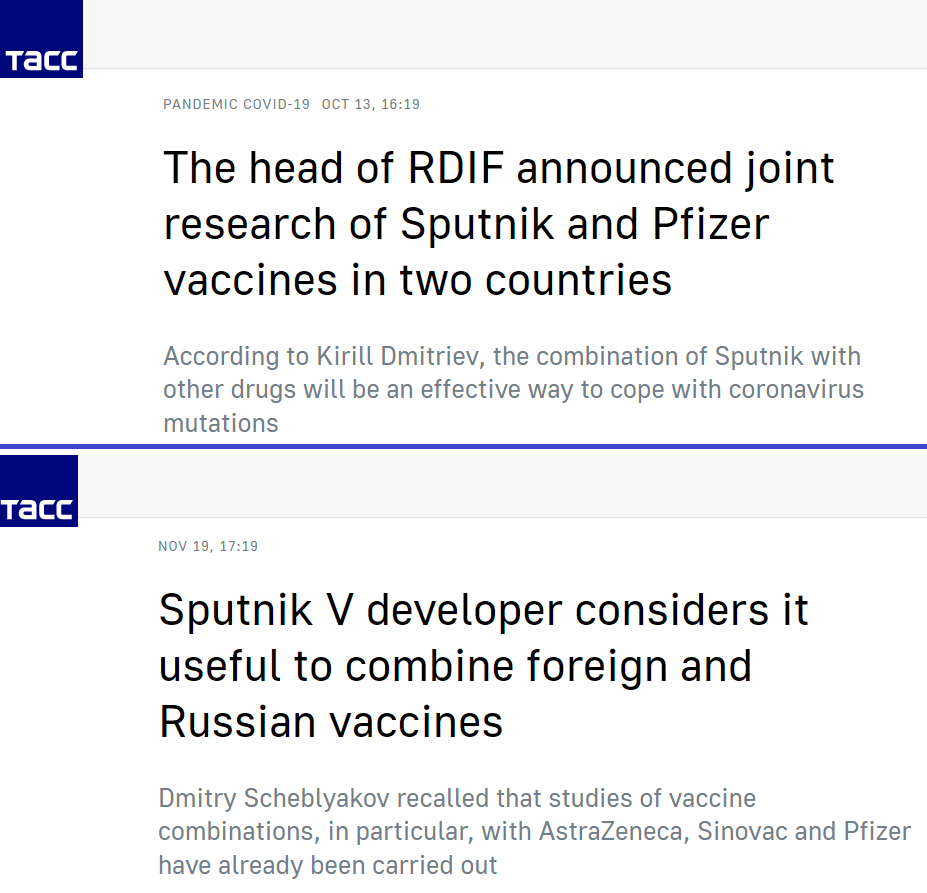
When I heard Canadian patriot and others speak of Russia and China competing on a unipolar alliance, I used to believe it.
But recently what Vanessa Beeley said about Syria helped me see more. Russia is letting Israel destroy trade routes with Iran, so Russia gets left with their trade routes.
It's global capitalism, globocap, as cj Hopkins likes to call it, that has and continues to enslave humanity.
London has a special place in the hearts, minds, pocket books, hopes, plans for children and other aspirations of Russian elites, so this connection between Russian Big Pharma business and the British one doesn't surprise me at all. Funny enough, among themselves they often call London - Londongrad, by analogy with Leningrad or Stalingrad, just to reflect the fact how at home they feel there. Some of the more popular songs in Russian pop music are about London, like "I'll move to live in London" by Timati and Grigory Leps, or "I dreamed of the skies of London" by Zemfira (links below).
https://youtu.be/djIAgcCnFmE
https://youtu.be/dFEYsvbSbdg
With this cultural digression aside, here is an interesting article I have found on the "conspiratorial" theories why Astra Zeneca may not be the best partner for R-Pharm and other Russian companies. This link will do an automatic translation from Russian to English through Yandex service that is superior in accuracy when it comes to Russian - English translations as compared to Google.
https://translate.yandex.com/?lang=ru-en&text=http%3A%2F%2Fkatyusha.org%2Fview%3Fid%3D16104
With all the importance of the Sputnik V topic, there is something more urgent going on right now. Big protests broke out in multiple large cities in Kazakhstan. Protesters and police were engaged in violent exchanges last night. Kazakh president Toqaev accepted government resignation few hours ago. The claimed reason for protests is the sudden price hike for LNG fuel, but the patience of Kazakhs was also exhausted by the strict anti-COVID measures implemented by government. The chance of these protests springing to regions in Russia is remote, but it is not zero. Russian people's confidence in the economic recovery has dipped to lowest level in 15 years according to Gallup poll.
https://www.rferl.org/a/kazakhstan-toqaev-unrest-protests-government-resignation/31639961.html